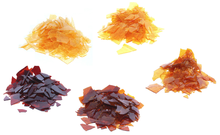

Lac is the resinous secretion of a number of species of lac insects, of which the most commonly cultivated is Kerria lacca.
Cultivation begins when a farmer gets a stick that contains eggs ready to hatch and ties it to the tree to be infested.[1] Thousands of lac insects colonize the branches of the host trees and secrete the resinous pigment. The coated branches of the host trees are cut and harvested as sticklac.
The harvested sticklac is crushed and sieved to remove impurities. The sieved material is then repeatedly washed to remove insect parts and other material. The resulting product is known as seedlac. The prefix seed refers to its pellet shape. Seedlac, which still contains 3–5% impurity, is processed into shellac by heat treatment or solvent extraction.
The leading producer of lac is Jharkhand, followed by the Chhattisgarh, West Bengal, and Maharashtra states of India.[citation needed] Lac production is also found in Bangladesh, Myanmar, Thailand, Laos, Vietnam, parts of China, and Mexico.
- ^ Derry, Juliane (2012). "Investigating Shellac: Documenting the Process, Defining the Product" (PDF). Project-Based Masters Thesis, University of Oslo. p. 27. Retrieved 3 July 2014.